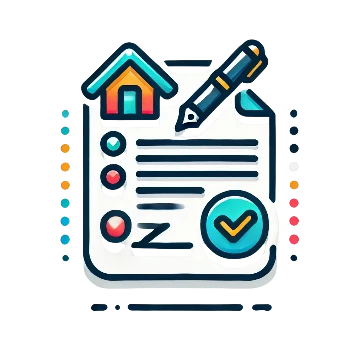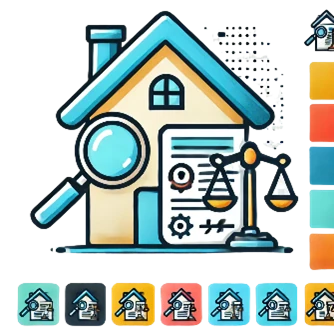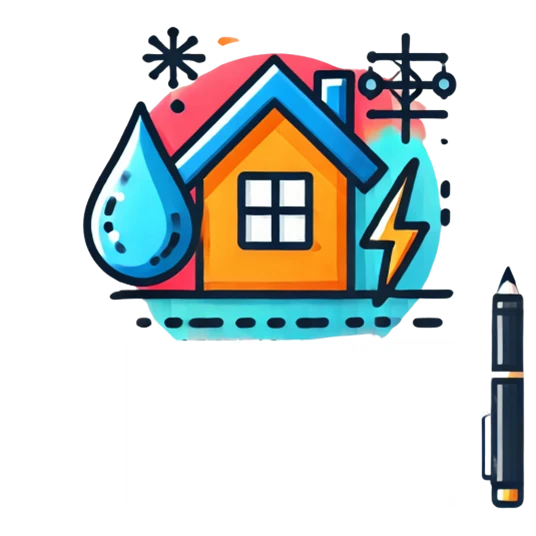How to buy a property in Spain? Step by step buying process using the example of the Costa Del Sol region

Author: Eve Keerus-Jusupov, CEO of Merlis Homes SL.
Helping you navigate Costa del Sol property with confidence and peace of mind.
Have a question? Contact me via WhatsApp
Here you will find a step-by-step guide on how the property buying process works in the Costa del Sol region of Spain if you decide to do it with us. The collaboration usually begins with a consultation via Zoom or by phone, where we go through all the important steps together.
No small talk, we get straight to the point.
Table of Contents:
- What kind of property are you looking for and what is your actual budget?
- Choose and work with a local real estate agent
- Searching for the right house or apartment
- If you need a loan, start working on it now
- Property viewing and technical inspection on-site
- Making an offer and negotiating the price
- Signing a reservation agreement
- Giving power of attorney to a lawyer – why is this beneficial for you?
- Legal background check of the property
- Signing the preliminary contract and paying the deposit
- Property inspection before the transaction
- Notarial property transaction
- Registering the property in your name
- Setting up electricity and water contracts in your name
- Paying the taxes related to the property purchase
- How long does the whole process take and when do you get the keys?
How do you buy property in Spain as a foreigner?
It doesn’t matter if you’re coming from America, Europe, India, or the UK – the buying process is the same for everyone. To ensure a safe transaction, you need a reliable local real estate agent and a lawyer who specializes in property law.
But now, let’s get into the buying process in more detail.
 1. What Kind of Property Are You Looking For and What Is Your Actual Budget?
1. What Kind of Property Are You Looking For and What Is Your Actual Budget?
Good preparation at this stage is key to saving both time and money—not just yours, but others’ too. If you’re new to this, now’s the perfect moment to take professional advice seriously.
Here’s how you can get started.
1. What Kind of Property Are You Looking For and What Is Your Actual Budget?

Good preparation at this stage is key to saving both time and money—not just yours, but others’ too. If you’re new to this, now’s the perfect moment to take professional advice seriously.
Here’s how you can get started.
Define Your Property Needs
Start by clarifying what you’re looking for:
- Purpose: Are you buying a home for personal use, rental income, or long-term investment?
- Criteria: What are your must-have features? Think about location, size, number of bedrooms, and amenities.
- Priorities: Organize your requirements by importance—what matters most to you?
- Flexibility: Be honest about areas where you can compromise and what is non-negotiable.
This step ensures you focus on properties that truly align with your goals.
Calculate Your Realistic Budget
Knowing your financial limits helps you avoid surprises:
Additional costs: In Spain, property listings usually exclude taxes and fees.
- For resale properties, add approximately 10% to the purchase price.
- For new developments, add around 13% to cover all additional costs.
Be clear about your upper spending limit.
By being realistic, you save time and focus only on properties within your reach.
Do You Need a Loan?
If financing is part of your plan, address it early:
- Determine whether you need a mortgage before starting your property search.
- Delays in arranging financing can lead to unnecessary stress during the process.
- Speak with a bank or mortgage advisor to explore your options and secure pre-approval if necessary.
Planning your finances early will make the buying process smoother and less overwhelming.
Move Forward with Confidence
With a clear plan, realistic budget, and clarity on financing, you’re ready to start your journey toward finding your dream property in Spain. Taking these steps ensures you’re well-prepared and can make informed decisions with ease.
 2. Choose and Work With a Local Real Estate Agent
2. Choose and Work With a Local Real Estate Agent
Selecting the right real estate agent is essential for saving time, minimizing expenses, and making the buying process as seamless as possible. Here’s how to identify and collaborate effectively with the best local professional.
2. Choose and Work With a Local Real Estate Agent

Selecting the right real estate agent is essential for saving time, minimizing expenses, and making the buying process as seamless as possible. Here’s how to identify and collaborate effectively with the best local professional.
How to Find the Right Agent
Ask for Recommendations
- Reach out to friends, family, or colleagues who have purchased property in the area for referrals.
Research Online
- Check if the real estate firm has a professional website that reflects their expertise.
- Look at their social media activity—do they showcase properties and engage with clients?
- Search for reviews and feedback on Google to assess their reputation.
Verify Their Experience
- Call potential agents and inquire about their previous transactions. Ask them to describe the area you’re interested in. A knowledgeable agent will offer valuable insights and tailored recommendations to align with your goals.
Connecting with Your Agent
Arrange a phone call, video chat, or Zoom meeting to evaluate their knowledge, professionalism, and how well you connect personally. Building a strong rapport is crucial for a successful partnership.
Understanding the Market
Shared Listings
- Most agencies in the area have access to the same property listings through a shared database called Resales-online, which includes active properties on the market.
Teamwork in Transactions
- Each deal typically involves a seller’s agent and seller’s lawyer, who represent the seller.
- The buyer’s agent and buyer’s lawyer work exclusively to protect your interests.
- This collaborative system ensures a smooth transaction while safeguarding both parties’ interests.
Commit to Your Agent
Once you’ve selected the right agent through thorough research, stay loyal to them throughout the process:
- Show respect for their efforts and avoid involving other agents, as they all have access to the same property listings.
- If this approach seems unfamiliar or unclear, don’t worry—I’ll explain it in more detail during our consultation.
Your Path to a Smooth Property Purchase
By choosing an experienced and trustworthy agent, you’ll set yourself up for a seamless, stress-free property-buying journey in Spain. This decision will save you time, reduce potential issues, and ensure you find the perfect home.
 3. Searching for the Right House or Apartment
3. Searching for the Right House or Apartment
Once you’ve established your budget and defined your property requirements, it’s time to start your search. While this stage can feel overwhelming, partnering with a knowledgeable local real estate agent streamlines the process and helps you save valuable time.
3. Searching for the Right House or Apartment

Once you’ve established your budget and defined your property requirements, it’s time to start your search. While this stage can feel overwhelming, partnering with a knowledgeable local real estate agent streamlines the process and helps you save valuable time.
Common Challenges with Property Portals
Platforms like Idealista and Fotocasa are popular starting points for property searches, but they come with limitations:
- Outdated Listings: Properties that seem available may already be sold.
- Misleading or Fake Properties: Some listings may be exaggerated or entirely non-existent.
- Communication Issues: Inquiries often go unanswered or take a long time to receive a response.
While these portals are useful for getting an overview of the market, they’re not always reliable for making serious decisions.
How an Agent Enhances Your Search
A skilled local real estate agent can make the search process more efficient by:
- Providing Reliable Listings: Accessing accurate and up-to-date properties directly from trusted databases that align with your budget and criteria.
- Performing Due Diligence: Verifying property availability, obtaining detailed information, and following up with sellers or their agents.
- Offering Realistic Guidance: Helping you understand what’s achievable within your budget, considering the location and property features you desire.
This level of professional support eliminates guesswork, reduces frustration, and ensures you don’t miss out on ideal opportunities.
Important Note
If you contact a listing on Idealista or similar portals directly, you automatically become the listing agent’s client. In such cases, your chosen agent cannot assist you further with that property. To maintain seamless coordination and maximize efficiency, it’s best to let your agent handle all inquiries on your behalf.
Next Steps: Selecting and Viewing Properties
- Collaborate With Your Agent: Narrow down your options to around 10 properties that meet your criteria.
- Prioritize: Rank the properties by importance to focus on the most appealing choices first.
- Viewings: Your agent will:
- Organize a well-coordinated viewing schedule.
- Plan routes to minimize travel time and maximize convenience.
A Clear Path to Your Dream Home
With a strategic plan and expert guidance, you’ll be fully prepared to take the next step in your property search and move closer to finding your ideal home.
 4. If You Need a Loan, Start Working on It Now!
4. If You Need a Loan, Start Working on It Now!
Determining whether you need financing is a critical step in the property-buying journey. If a loan is necessary, here are some options to consider for securing it.
4. If You Need a Loan, Start Working on It Now!

Determining whether you need financing is a critical step in the property-buying journey. If a loan is necessary, here are some options to consider for securing it.
Loan Options
- From Your Home Country: Applying for a loan with a bank in your home country can often be faster and more straightforward. Using property in your home country as collateral may increase your chances of approval.
- From a Spanish Bank: Spanish banks provide financing for property purchases, but be prepared for a more detailed process requiring extensive documentation.
- Alternative Financial Sources: Consider private lenders or alternative financing options, but always verify their reliability and legitimacy.
Tip: Submit all necessary documents to your bank early to determine how much you can borrow. Request a written confirmation of the maximum loan amount to plan your budget effectively.
Foreigners Can Get Loans in Spain
- Loan Amounts: Spanish banks typically finance 50% to 70% of the property value for foreign buyers.
- Documentation Requirements: Be ready to provide proof of income, assets, and overall financial stability.
- Timeline: The approval process may take longer compared to securing a loan in your home country.
- Interest Rates: Rates are often higher for foreign buyers, and non-EU citizens may face stricter conditions or additional requirements.
Important Considerations
- Involve Experts: Collaborate with a local lawyer or a mortgage broker who specializes in loans for foreigners. Their guidance can save time and help ensure compliance with Spanish banking regulations.
- Open a Bank Account: If you secure a loan from a Spanish bank, opening an account with the same institution can simplify transactions and facilitate the loan process.
- Start Early: Begin your mortgage application as soon as possible and ensure all required documents are submitted promptly to avoid delays.
A Confident Step Toward Your Dream Home
By addressing financing early and relying on professional expertise, you’ll navigate the loan process smoothly and approach your property purchase in Spain with confidence and peace of mind.
 5. Property Viewing and On-Site Technical Inspection
5. Property Viewing and On-Site Technical Inspection
When exploring online advice, you may find that this crucial step is frequently overlooked. Now that you’ve narrowed your options to 5–10 properties, it’s time to schedule in-person visits with your real estate agent to evaluate them thoroughly.
5. Property Viewing and On-Site Technical Inspection

When exploring online advice, you may find that this crucial step is frequently overlooked. Now that you’ve narrowed your options to 5–10 properties, it’s time to schedule in-person visits with your real estate agent to evaluate them thoroughly.
What to Expect During the First Viewing
The first viewing gives you a chance to form an initial impression of the property.
An experienced real estate agent can spot potential issues, such as:
- Structural Defects: Cracks in walls or ceiling damage.
- Foundation Problems: Signs of instability that might require costly repairs.
- Outdated Systems: Old or malfunctioning electrical wiring or air conditioning units.
Using a Checklist for Inspection
To minimize the risk of unexpected costs later, it’s essential to approach each viewing systematically. A detailed on-site inspection checklist helps you:
- Stay focused on critical details.
- Evaluate the property thoroughly and compare it with others.
Consider a Technical Assessment
For greater peace of mind, hiring a specialist for a professional assessment is highly recommended. They will provide:
- A comprehensive report on the property’s condition.
- Estimates for potential renovation costs.
- A solid basis for negotiating the price, ensuring you don’t overpay.
Making Realistic Choices
After visiting multiple properties, you’ll likely identify areas where compromise is necessary. Keep in mind:
Few Properties Are Perfect.
About 90% of homes won’t meet all your criteria. Flexibility is crucial.
Examples of Compromises:
- A home with stunning views might require significant renovation.
- An Andalusian-style house may lack modern technical systems.
- A property near shops and schools could come with less tranquility.
Informed Decisions Lead to the Best Choices
By attending viewings with a plan, utilizing a detailed checklist, and considering professional assessments, you’ll make more confident decisions. This ensures a balanced approach that aligns your priorities with available options, bringing you closer to your ideal property.
 6. Making an Offer and Negotiating the Price
6. Making an Offer and Negotiating the Price
Once you’ve found the right property, the next step is to make an offer and negotiate the price. This phase is crucial, and having a knowledgeable real estate agent by your side ensures the process is efficient and well-informed.
6. Making an Offer and Negotiating the Price

Once you’ve found the right property, the next step is to make an offer and negotiate the price. This phase is crucial, and having a knowledgeable real estate agent by your side ensures the process is efficient and well-informed.
Preparing to Make an Offer
Your real estate agent plays a vital role in guiding you through this critical phase by helping you:
- Understand the Market: They analyze recent sales of comparable properties and average prices in the area to ensure your offer aligns with market values.
- Compare Listings: Reviewing similar properties on portals can provide additional insight into pricing and condition, supporting your decision-making.
The Role of Your Agent in Negotiations
Your agent goes beyond delivering messages—they act as your trusted consultant to devise the most effective strategy.
Insights from the Selling Agent
- The selling agent may provide hints about the seller’s minimum acceptable price, giving your agent valuable leverage in negotiations.
Communication Process
- Your offer is shared with the seller’s agent, who presents it to the owner.
- Counteroffers are relayed back through your agent, ensuring transparency and precision at every step.
Using Effective Arguments in the Offer Process
Your agent can employ strategic arguments to strengthen your position:
Highlight Property Issues:
- Structural defects or costly repairs revealed during inspections can justify a lower offer.
- A technical inspection report provides solid evidence to support your case.
Understand the Seller’s Motivation:
- Knowing the reason for the sale, such as financial urgency or relocation, helps assess their flexibility.
Exclude Unnecessary Items:
- Removing unwanted items, like outdated furniture, can be a useful bargaining tool.
Emphasize Financial Readiness:
- Buyers with readily available funds or those who don’t require a loan are often more appealing to sellers.
Collaboration Is Key
Successful negotiation relies on teamwork. Your agent ensures:
- Well-Founded Offers: Your offer is realistic and backed by market data.
- Clear Communication: All parties are kept informed, avoiding misunderstandings.
- Smooth Transactions: The process moves forward efficiently with your interests as the priority.
A Step Closer to Your Dream Property
With the right strategy, clear communication, and a supportive agent, the negotiation phase becomes an opportunity to secure the best possible deal and move confidently toward owning your ideal property.
 7. Signing a Reservation Agreement
7. Signing a Reservation Agreement
After your offer is accepted, the next step involves signing the reservation agreement, a legally binding document that secures the property for you and outlines the terms for proceeding. While it may seem simple, this agreement plays a critical role in protecting your interests. It ensures that all essential terms are clearly defined and provides a framework for addressing potential disputes or issues during the transaction process.
7. Signing a Reservation Agreement

After your offer is accepted, the next step involves signing the reservation agreement, a legally binding document that secures the property for you and outlines the terms for proceeding. While it may seem simple, this agreement plays a critical role in protecting your interests. It ensures that all essential terms are clearly defined and provides a framework for addressing potential disputes or issues during the transaction process.
What Should the Reservation Agreement Include?
1. Detailed Description of the Property
- Exact address and property type (e.g., apartment, townhouse, house).
- Associated elements like parking spaces or storage rooms, with specific details.
2. Amount and Conditions of the Reservation Fee
- Reservation fee amount.
- Payment details (how, when, and to whom).
- Terms for refunding or retaining the fee based on buyer’s or seller’s actions.
3. Property Price and Payment Terms
- Total agreed price of the property.
- Payment schedule, including initial deposit and final payment dates.
4. Seller’s Obligations
- Commitment to remove the property from the market upon signing.
- Agreement not to negotiate with third parties during the reservation period.
5. Deadlines
- Payment deadlines for the reservation fee and deposit.
- Timelines for signing the preliminary contract and final notarial deed.
- Penalties for missed deadlines (e.g., forfeiture of the reservation fee).
6. Buyer’s Rights and Obligations
- Obligation to follow the payment schedule.
- Right to conduct a legal review of the property.
- Right to refund of the reservation fee if financing isn’t approved (if stipulated).
7. Withdrawal Conditions
- Grounds for withdrawal by the buyer or seller.
Consequences of withdrawal:
- If the buyer withdraws, the fee is forfeited.
- If the seller withdraws, they may need to return double the reservation fee.
8. Special Clauses
- Agreed property condition and repairs (e.g., repainting, installing appliances).
- Specific inclusions like furniture, with an attached inventory list.
- Timeline for tenant removal, if applicable.
- Final inspection date before the notarial transaction.
9. Confidentiality Clauses
- Agreement not to disclose terms or price to third parties without mutual consent.
10. Legal and Notary Fees
- Allocation of fees (e.g., notary fees typically paid by the buyer, unless agreed otherwise).
11. Applicable Law and Jurisdiction
- Legal framework governing the agreement.
- Jurisdiction for resolving disputes (usually the local court).
12. Signatures and Dates
- Signatures of both parties confirming agreement to the terms.
- Date of signing.
Best Practices for Signing the Reservation Agreement
Sign the agreement first and then transfer the reservation fee to a secure account, such as:
- The buyer’s lawyer’s client account.
- The seller’s lawyer’s client account.
- The real estate firm’s client account representing the seller.
Your Real Estate Agent’s Role
Your agent ensures:
- All critical points are included, such as mortgage terms, furniture arrangements, short-term rental potential, or tenant-related issues.
- Your interests as the buyer are protected throughout the process.
- The transaction proceeds smoothly with minimal risks.
Moving Forward With Confidence
By carefully reviewing and signing the reservation agreement, you establish a strong foundation for the property-buying process. With a well-drafted agreement and expert support, you can move forward confidently toward securing your dream property.
 8. Granting Power of Attorney to a Lawyer
8. Granting Power of Attorney to a Lawyer
Granting power of attorney to a lawyer is a highly convenient way to manage your property purchase in Spain. This step allows the lawyer to represent you in all legal, financial, and administrative matters, ensuring a smooth and hassle-free process.
8. Granting Power of Attorney to a Lawyer

Granting power of attorney to a lawyer is a highly convenient way to manage your property purchase in Spain. This step allows the lawyer to represent you in all legal, financial, and administrative matters, ensuring a smooth and hassle-free process.
Why Is Granting Power of Attorney Beneficial?
Flexibility: You can grant power of attorney at a notary:
- Immediately, allowing your lawyer to oversee the entire process, including mortgage applications.
- After selecting a property, if you prefer to finalize your choice first.
Convenience: Once granted, your lawyer can handle all legal, financial, and administrative tasks, eliminating the need for you to oversee or travel for these steps personally.
What Does the Lawyer Handle for You?
1. NIE Application
- The NIE (Número de Identificación de Extranjero) is mandatory for foreigners engaging in economic activities in Spain, including property purchases.
2. Mortgage Application
- If financing is required, your lawyer will manage the mortgage application on your behalf.
3. Opening a Bank Account
- Your lawyer will open a Spanish bank account in your name, enabling seamless payments and transfers.
4. Legal Check of the Property
- They ensure the property is free of legal issues, including debts, liens, or ownership disputes.
5. Preparation of Preliminary Contracts and Transfers
- The lawyer drafts the preliminary contract and manages secure financial transfers.
6. Preparation of the Notarial Contract
- They prepare the final contract for signing at the notary and oversee all payments.
7. Property Registration
- The property is registered in your name at the Land Registry.
8. Utility Contracts
- They arrange connections for electricity, water, and internet, and can manage initial utility bills if needed.
Why It’s Worth It
Time-Saving and Stress-Free
- The process becomes streamlined and efficient, saving you from navigating Spanish administrative complexities.
Safe and Professional Handling
- Ideal for non-residents or those unfamiliar with Spanish property procedures, ensuring your interests are fully protected.
Cost of Legal Services
- On the Costa del Sol, legal fees typically amount to 1% of the property’s purchase price plus VAT.
- While this adds to your overall expenses, the convenience, security, and expertise offered by a professional are well worth the investment.
A Smooth and Secure Property Purchase
Granting power of attorney to a trusted lawyer ensures your property purchase in Spain is handled efficiently, securely, and with minimal effort on your part, giving you peace of mind throughout the entire process.
 9. Legal Due Diligence for Property
9. Legal Due Diligence for Property
Purchasing a property in Spain goes beyond finding your dream home—it requires ensuring that the property is legally sound and free from any complications. This is where your lawyer’s role in conducting comprehensive legal due diligence becomes essential. While technical inspections focus on the property’s physical condition, your lawyer will handle these critical legal aspects.
9. Legal Due Diligence for Property

Purchasing a property in Spain goes beyond finding your dream home—it requires ensuring that the property is legally sound and free from any complications. This is where your lawyer’s role in conducting comprehensive legal due diligence becomes essential. While technical inspections focus on the property’s physical condition, your lawyer will handle these critical legal aspects.
Key Legal Checks by Your Lawyer
1. Property Ownership
- Verifies that the seller legally owns the property and has the right to sell it.
Reviews key documents, including:
- Nota Simple: A summary of the property’s legal status.
- Escritura: The official notarial deed confirming ownership transfer.
2. Encumbrances and Mortgages
- Ensures the property is free from mortgages, loans, liens, or other financial obligations that could affect the purchase or your future ownership.
3. Planning and Building Permits
- Confirms compliance with planning and building regulations.
- Checks for required documents such as building permits, certificates, and the occupancy license.
4. Connections to Infrastructure
- Verifies access to essential utilities, including water, electricity, sewage, and internet.
5. Taxes and Fees
- Ensures local taxes, such as property tax and garbage collection fees, are fully paid.
- Checks for any outstanding debts tied to the property.
6. Restrictions and Easements
- Investigates any legal restrictions or easements, such as access rights or usage limitations, that could impact your ownership or use of the property.
7. Community-Related Issues
For properties in a community (e.g., apartments):
- Reviews community regulations, including short-term rental permissions.
- Checks financial statements and ensures there are no outstanding community debts.
8. Environmental Concerns
- Determines whether the property is located in a protected environmental area or subject to restrictions that may limit its use or development potential.
9. Contract Review
- Analyzes the sales contract and any related agreements to ensure clarity, fairness, and legal compliance for all parties.
10. Historical or Cultural Restrictions
- Verifies if the property is listed as a historical or cultural monument, which may restrict renovations or modifications.
Why This Matters
Handling these checks on your own is complex and time-consuming, with the potential for costly mistakes. By entrusting these tasks to a professional lawyer, you:
- Minimize Risks: Avoid legal or financial issues after the purchase.
- Save Time and Effort: Let a professional manage the complexities on your behalf.
- Ensure Legal Compliance: Be confident that every aspect of the transaction is secure.
With your lawyer managing these crucial steps, you can focus on the exciting journey of purchasing your property, knowing your interests are fully protected.
 10. Signing the Private Purchase Contract and Paying the Deposit
10. Signing the Private Purchase Contract and Paying the Deposit
Once your lawyer has completed thorough legal due diligence and ensured all terms of the reservation agreement are met, the next step is signing the Private Purchase Contract (Contrato Privado de Compraventa). This legally binding agreement formalizes the terms between you and the seller, securing the property under agreed conditions.
10. Signing the Private Purchase Contract and Paying the Deposit

Once your lawyer has completed thorough legal due diligence and ensured all terms of the reservation agreement are met, the next step is signing the Private Purchase Contract (Contrato Privado de Compraventa). This legally binding agreement formalizes the terms between you and the seller, securing the property under agreed conditions.
The Role of Your Lawyer
- Contract Preparation: Your lawyer ensures the contract is accurately drafted, fair, and legally binding, with all essential clauses included.
- Signing on Your Behalf: If you’ve granted power of attorney, your lawyer can sign the contract and pay the deposit, saving you time and effort.
Key Elements of the Private Purchase Contract
1. Deposit Amount and Conditions
- The deposit is typically 10% of the property price.
- If the buyer withdraws without valid reasons, the deposit may be forfeited to the seller.
2. Legal Issues With the Property
- If hidden issues arise, such as encumbrances, mortgages, or missing permits, the buyer has the right to withdraw and receive a full refund of the deposit.
3. Seller’s Breach of Contract
If the seller fails to meet obligations, such as:
- Removing the property from the market.
- Correcting agreed-upon defects.
- The buyer can withdraw and reclaim the deposit.
4. Significant Property Damage
- If substantial damage occurs before the final contract (e.g., fire or natural disaster), the buyer can withdraw and receive a deposit refund.
5. Third-Party Rights
- If undisclosed third-party rights affect ownership or usage, the buyer can withdraw and recover the deposit.
Before Signing
Your lawyer will review the Private Purchase Contract in detail, ensuring:
- All terms are clear, fair, and protect your rights.
- The agreement aligns with what was negotiated.
This review ensures you fully understand the contract before proceeding, providing a secure and confident step in the purchasing process.
Moving Forward
By securing your deposit and formalizing the agreement, this stage cements your position as the buyer and brings you one step closer to successfully completing your property purchase.
 11. Property Inspection Before the Notarial Transaction
11. Property Inspection Before the Notarial Transaction
Conducting a final property inspection before signing the notarial contract is an essential step in the buying process. It confirms that the property adheres to all agreed-upon conditions, giving you peace of mind and protecting you from unexpected issues after the transaction is finalized.
11. Property Inspection Before the Notarial Transaction

Conducting a final property inspection before signing the notarial contract is an essential step in the buying process. It confirms that the property adheres to all agreed-upon conditions, giving you peace of mind and protecting you from unexpected issues after the transaction is finalized.
Why Is This Step Important?
- Post-Transaction Challenges: Resolving issues after the transaction can be nearly impossible, especially if the seller is a non-local resident.
- Peace of Mind: A final inspection lets you address concerns before completing the deal, ensuring the property meets your expectations.
What Should Be Checked?
You can perform the inspection yourself, hire a professional service, or delegate it to a trusted representative. The following points are essential:
1. Confirmation of Property Handover
- Verify that the property is vacant and ready for transfer, with any previous residents or tenants having moved out.
2. Inspection of the Property’s Condition
- Ensure the property is in the agreed condition, with all required repairs completed.
3. Receipt of Property Documents and Keys
- Confirm that all necessary documents (e.g., energy efficiency certificates, warranties) and keys are ready for handover.
4. Functionality Check of Appliances and Systems
- Test included systems and appliances, such as heating, cooling, water supply, and electrical systems, to ensure they are fully operational.
5. Payment of Final Utility Bills and Taxes
- Confirm that the seller has settled all outstanding utility bills and local taxes, preventing future liabilities for you.
6. Discovery of Hidden Defects
- Look for any new or hidden issues that could affect the property’s value or your willingness to proceed.
7. Furniture and Inventory Check
- If the contract includes furniture or other items, verify their presence and condition.
8. Confirmation of Agreed Changes or Repairs
- Ensure all agreed-upon changes or repairs have been completed to the agreed standard.
How the Inspection Is Conducted
Typically, a property visit is arranged a few days before the notarial transaction. This visit provides an opportunity to:
- Verify the property’s condition matches what was agreed in the contract.
- Address any last-minute concerns or discrepancies before finalizing the purchase.
Secure the Final Stages of Your Property Purchase
By conducting a thorough inspection, you minimize risks, confirm that your expectations are met, and move forward confidently with the final stages of your property purchase. This step ensures a smooth transition into your new home or investment.
 12. Notarial Property Transaction
12. Notarial Property Transaction
The notarial transaction marks the official completion of your property purchase in Spain. It serves as a final control mechanism, ensuring that all legal and administrative preparations are in order before ownership is transferred.
12. Notarial Property Transaction

The notarial transaction marks the official completion of your property purchase in Spain. It serves as a final control mechanism, ensuring that all legal and administrative preparations are in order before ownership is transferred.
What Happens During the Notarial Transaction?
1. Signing of the Public Deed of Sale (Escritura Pública de Compraventa)
- This document officially transfers property ownership to the buyer.
- It is signed by the buyer, seller, and notary in the presence of all parties.
2. If You’re Using a Mortgage
- A bank representative will attend to sign the mortgage agreement alongside the public deed.
3. Verification of Payment and Documentation
- The notary confirms that all payments (e.g., final property price, taxes, and fees) have been made.
- Your lawyer and the notary ensure all documents comply with legal requirements.
Congratulations!
Once the deed is signed, you officially become the owner of the property.
Key Handover and Practical Information
In Spain, it’s uncommon for the previous owner to hand over the keys personally or provide a property walkthrough.
Instead:
- Your real estate agent or lawyer will typically hand over the keys after the transaction.
- You can then visit your new home and start arranging it to your liking.
The Final Step in Your Journey
The notarial transaction marks the final step in the property-buying process. With all preparations handled by your lawyer, it ensures a seamless and stress-free experience.
Congratulations on your new home! 🎉
 13. Registering the Property in Your Name
13. Registering the Property in Your Name
After the sale-purchase agreement is signed, the notary will notify the Land Registry about the transaction. However, it is the responsibility of either you or your lawyer to ensure that the property is formally registered in the new owner’s name.
13. Registering the Property in Your Name

After the sale-purchase agreement is signed, the notary will notify the Land Registry about the transaction. However, it is the responsibility of either you or your lawyer to ensure that the property is formally registered in the new owner’s name.
How the Registration Process Works
1. Notary Notification
- The notary sends an official notification to the Land Registry immediately after the transaction.
2. Ownership Registration
- Your lawyer submits the required documents and fees to the Land Registry to finalize the ownership transfer.
- The registration process can take up to 30 working days to complete.
3. Confirmation
- Once the Land Registry processes the registration, you will receive a Land Registry certificate, officially finalizing the ownership transfer.
Important Note
If you plan to rent out your property short-term, the Land Registry certificate is essential for applying for a tourist license. This document proves that the property is legally registered in your name.
Securing Your Ownership
By ensuring timely registration, you protect your ownership rights and gain the flexibility to manage or use your property as planned. This final step brings you peace of mind and full legal control over your new home.
 14. Setting Up Electricity and Water Contracts in Your Name
14. Setting Up Electricity and Water Contracts in Your Name
To ensure your new property is ready for immediate use, your lawyer will manage the process of transferring electricity and water contracts into your name.
14. Setting Up Electricity and Water Contracts in Your Name

To ensure your new property is ready for immediate use, your lawyer will manage the process of transferring electricity and water contracts into your name.
 15. Paying Taxes Related to Property Purchase
15. Paying Taxes Related to Property Purchase
Understanding the taxes and associated costs of purchasing property in Spain is essential for budgeting effectively. Your lawyer or real estate agent will typically provide an estimated total, including the amount you’ll need to transfer to your Spanish bank account. Below are examples of costs for resale properties and new developments on the Costa del Sol.
15. Paying Taxes Related to Property Purchase

Understanding the taxes and associated costs of purchasing property in Spain is essential for budgeting effectively. Your lawyer or real estate agent will typically provide an estimated total, including the amount you’ll need to transfer to your Spanish bank account. Below are examples of costs for resale properties and new developments on the Costa del Sol.
Example: Resale Property
For a privately owned property with a purchase price of €500,000, the estimated costs are:
- Purchase Price: €500,000
- Transfer Tax (7%): €35,000
- Lawyer’s Fee (1% + 21% VAT): €6,050
- Notary and Land Registry Fees (0.5%): €2,500
- Total: €543,550
- Additional Costs: €43,550
Example: New Development
For a new development property with a purchase price of €500,000, the estimated costs are:
- Purchase Price: €500,000
- IVA (VAT): 10% of the purchase price = €50,000
- Notary Fees: €1,500–€2,000 (average: €1,750)
- Land Registry Fees: €900–€1,500 (average: €1,200)
- Lawyer’s Fee: 1% of the purchase price + 21% VAT = €6,050
- Stamp Duty: 1.2% of the purchase price = €6,000
- Total Estimated Cost: €565,000
- Additional Costs: €65,000
Mortgage-Related Costs
If you finance the property with a Spanish bank, expect additional expenses:
- Mortgage Service Fee: 0.5%–1.5% of the loan amount.
- Property Valuation: Approximately €600.
Summary
These examples highlight the additional costs associated with buying property on the Costa del Sol. Proper financial planning and consultation with your lawyer or real estate agent are crucial to ensure sufficient funds for taxes, fees, and other expenses. Planning ahead ensures a smoother transaction and peace of mind.
 16. How Long Does the Process Take Until You Get the Keys?
16. How Long Does the Process Take Until You Get the Keys?
In Short: Plan for 2–3 Months
Timeline Overview
- 2 Months: If you’re well-prepared and have sufficient funds in your bank account, the entire process—from selecting the property to receiving the keys—can take up to 2 months.
- 3 Months: If financing is involved, expect the process to take up to 3 months, as mortgage approvals require additional time.
Factors That May Cause Delays
1. Legal Due Diligence
- The thorough legal checks performed by your lawyer are often the most time-consuming step in the process.
2. Document Preparation
- Delays can occur if the buyer doesn’t provide all the necessary documents for the transaction in a timely manner.
Planning Ahead
By preparing your documents in advance and staying proactive during legal checks, you can help minimize delays and ensure a smoother property purchasing experience.
16. How Long Does the Process Take Until You Get the Keys?

In Short: Plan for 2–3 Months
Timeline Overview
- 2 Months: If you’re well-prepared and have sufficient funds in your bank account, the entire process—from selecting the property to receiving the keys—can take up to 2 months.
- 3 Months: If financing is involved, expect the process to take up to 3 months, as mortgage approvals require additional time.
Factors That May Cause Delays
1. Legal Due Diligence
- The thorough legal checks performed by your lawyer are often the most time-consuming step in the process.
2. Document Preparation
- Delays can occur if the buyer doesn’t provide all the necessary documents for the transaction in a timely manner.
Planning Ahead
By preparing your documents in advance and staying proactive during legal checks, you can help minimize delays and ensure a smoother property purchasing experience.
If you’ve read through the entire text, give yourself a pat on the back!
If you have any questions, feel free to write to eve@merlishomes.com.



